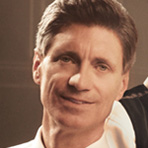Specialty
Frank Longo
Alzheimer's, Neurology & Huntington's Research
Self Exam
- Occupation: Neurologist; Chairman, Department of Neurology & Neurological Science, Stanford University
- Alternative career choice: Car dealer
- What do rock stars and scienctists have in common: Passion!
- Musical Instrument I Play: Keyboard / Rock Band
- I tend to approach life: A dreamer and idealist, in love with my wife and kids. I grew up with a sister with cerebral palsy, a condition involving brain damage at birth that keeps her confined to a wheel chair. I still have not accepted that there will never be a treatment available that can allow her to walk.
- Biggest misconceptions about me or my work: That its all about the latest technology when the most important part is the creativity, passion and attention to detail.
- Worst part-time job ever: Its funny that even the jobs that should have been boring offered something that seemed like an adventure.
- Longest med school study session: 18 hour study sessions; 36 hour on call rotations.
- Best moment in medicine/research: Medicine: Sitting all alone at 3 AM in a dark hospital hallway in New York City helping a woman who had just lost her husband of 50 years. Research: Seeing one of the small molecules that we created reversing brain degeneration in aged mice
About My Research
Disease Area: Alzheimer's disease and other neurological disorders for which there are no known effective therapies.
Research Area: We are focused on harnessing the potent processes that underlie the formation of the nervous system to prevent or treat neurological disorders.
Science Impact/Accomplishments or Goal: Remarkably, there are no effective treatments for Alzheimer's and other neurodegenerative disorders. My research team and I have pioneered the discovery and development of small molecules that target and modulate the fundamental mechanisms controlling the survival of neurons and the maintenance and formation of their synaptic connections. These small molecules are serving as leads to develop new drugs. Quite unexpectedly, these novel compounds are proving to be effective in preclinical studies of a large range of disorders including Down's syndrome, Rett autistic syndrome, stroke, spinal cord injury and multiple sclerosis.
Research Description: Finding an effective drug for a disorder is quite literally like finding a needle in a haystack – a real large haystack. Our laboratory team and collaborators have developed a way of screening millions of compounds by computer simulation. Compounds that look promising are then tested on neurons grown in a laboratory incubator under special conditions to determine which have the greatest potency in preventing degeneration or promoting the formation of new synaptic connections. The best compounds are being moved toward human trials."
Biography
Dr. Longo is the George E. and Lucy Becker Professor of Neurology and Neurological Sciences at Stanford University and Chairman of the Department of Neurology and Neurological Sciences. Dr. Longo received his MD in 1981 and PhD in Neurosciences in 1983 at the University of California, San Diego. Following an internship in medicine at NYU, he trained as a resident and a fellow in the Department of Neurology at the University of California, San Francisco. As a faculty member at UCSF he led the development of one of the first programs to offer DNA testing for Huntington’s disease and other neurodegenerative disorders, and the creation of a national referral center for deep brain stimulation for Parkinson’s disease. At UCSF he was promoted to professor and vice chair of the Department of Neurology and in 2001 was recruited to be chairman of the Department of Neurology at the University of North Carolina, Chapel Hill. At UNC, Dr. Longo launched programs in Alzheimer’s disease, stroke, multiple sclerosis and Parkinson’s disease. In 2006, Dr. Longo became chairman of the Department of Neurology and Neurological Sciences at Stanford where he and his colleagues have launched and expanded programs in neurodegenerative diseases and other neurological areas. A major goal in the field of neuroscience has been to create small, drug-like molecules that can mimic and achieve the potent effects of naturally occurring growth factors in the nervous system. Dr. Longo’s research team and his collaborators have pioneered the discovery of such compounds and these molecules are showing considerable promise in pre-clinical models of Alzheimer’s disease, stroke, Down’s syndrome, multiple sclerosis and other neurological disorders. These conceptual and practical advances move the neuroscience field closer to the long-sought objective of harnessing potent naturally occurring mechanisms to target underlying causes of neurological disease. Dr. Longo serves on multiple committees at the National Institutes of Health dedicated to promoting translational research and serves on many scientific boards including the Alzheimer’s disease Drug Discovery Foundation. He is a recipient of an Outstanding Alumnus Award from UC San Diego, the prestigious Paul B. Beeson Award in Aging Research, a Distinguished Leadership Award from the Huntington’s Disease Society of America and in 2006 was named a Stanford Fellow.





